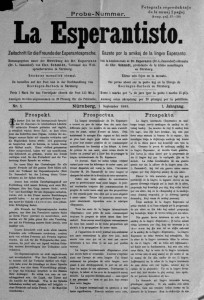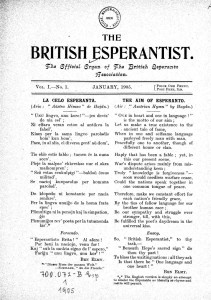Early Esperanto magazines available online Posted by Chuck Smith on Jun 21, 2011 in Uncategorized
Have you ever wanted to read the first magazine ever printed in Esperanto? That was La Esperantisto which ran from 1889 until 1895. It eventually stopped being printed, because the Russian censors no longer let the magazine enter their country. At that time, 3/4 of their subscribers lived in Russia, so that effectively killed the publication. I was quite interested to find that the first issue was written parallel in German, French and Esperanto (as seen in the image here on the right), which makes a lot of sense for a language which was only 2 years old at the time!
In any case, the Austrian National Library now makes it possible for you to read these cultural treasures. As of this writing, the Austrian National Library (which also has their own Esperanto museum) has scanned 17 early planned language magazines and have made them available online to the world. That means if you want to see the full continuation, you can continue reading Lingvo Internacia (1895-1914) and then Internacia Bulteno (1914-1918). The early issues of Universal Esperanto Association’s Esperanto magazine can also be quite interesting which started printing in 1905 and the library has scanned until 1946.
There are also a collection of early magazines printed by national associations, such as Austria Esperantisto, The British Esperantist, Casopis Ceskych Esperantistu, Germana Esperantisto and Pola Esperantisto! So far, I’ve found an interesting ad for Esperanto cigarettes in The British Esperantist. Can you find any other interesting articles or advertisements?
Among their other materials, you will find two early literature magazines Literatura Mondo and La Revuo. Note that in current Esperanto usage, if someone refers to “La Revuo”, they are typically speaking of UEA’s magazine Esperanto. There is also a magazine for stamp collectors Amikeco and getting more local and niche, you will find a magazine for Austrian Catholics Informoj por la anoj de la Austria Katolika Ligo Esperantista and even La dek-sepa for those living in the 17th district of Paris! Intriguingly enough, you can also find early editions of the international magazine for Occidental speakers called Cosmoglotta.
Unfortunately not all the collections are complete and there is no way to search the content as they are just images. The part of the website containing the scans is completely in German, so here are some helpful words to get around:
- Jahresauswahl – annual collection
- Übersicht – overview
- Haupttext – main text
- voriger/nächste – previous/next
- Seite – page
In any case, we can at least be very grateful of this fascinating gateway into the way people perceived Esperanto at this time and it can be fun to randomly dig around the magazines without having to visit the headquarters of a large Esperanto institution. Of course, if you ever get a chance to visit such an institution, I’d highly recommend it! In any case, follow the link to read their scanned magazine archive and also visit their scanned book collection. If you find anything interesting, let us know in the comments!
[Original Source: Literatura Mondo legebla en Interreto]

Build vocabulary, practice pronunciation, and more with Transparent Language Online. Available anytime, anywhere, on any device.
About the Author: Chuck Smith
I was born in the US, but Esperanto has led me all over the world. I started teaching myself Esperanto on a whim in 2001, not knowing how it would change my life. The timing couldn’t have been better; around that same time I discovered Wikipedia in it’s very early stages and launched the Esperanto version. When I decided to backpack through Europe, I found Esperanto speakers to host me. These connections led me to the Esperanto Youth Organization in Rotterdam, where I worked for a year, using Esperanto as my primary language. Though in recent years I’ve moved on to other endeavors like iOS development, I remain deeply engrained in the Esperanto community, and love keeping you informed of the latest news. The best thing that came from learning Esperanto has been the opportunity to connect with fellow speakers around the globe, so feel free to join in the conversation with a comment! I am now the founder and CTO of the social app Amikumu.






Comments:
Anaika Joseph:
Mi amas tio blog! Cxu vi estas komencanto?